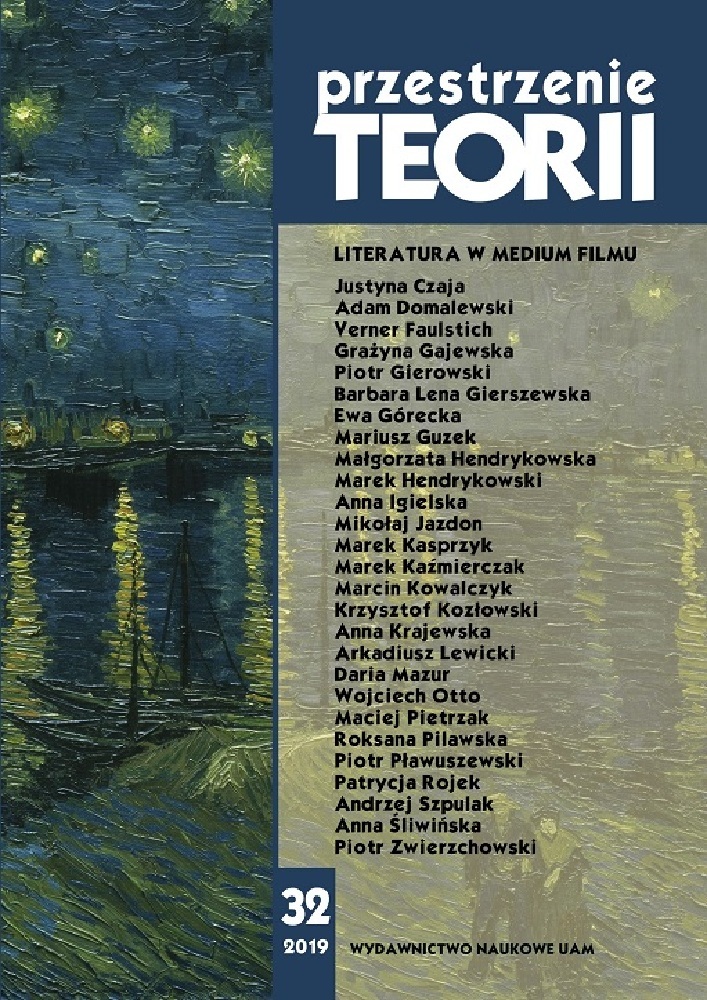Abstrakt
Gajewska Grażyna, Cyborgi – literacko-filmowe figury dyskursu interaktywnego [Cyborgs – Literary and Film Figures of Interactive Discourse]. „Przestrzenie Teorii” 32. Poznań 2019, Adam Mickiewicz University Press, pp. 179–196. ISSN 1644-6763. DOI 10.14746/pt.2019.32.9.
The author analyzes the figure of the cyborg in science fiction literature and film. The text begins by showing this kind of literary work in the theoretical field and presents it as an interactive discourse. The author describes the scientific roots of constructing a human-technical hybrid, emphasizing the ideological and political context of this research. In this approach, the cyborg appears as a participant in and also a hostage of the Cold War. Next, the author finds literary and film creations of cyborgs inspired by this political and military heritage. The article also presents alternative images of cyborgs co-creating a feminist and postcolonial discourse. They were also included in specific policies and strategies aimed at deconstructing concepts such as sex and gender, sexuality, race, nation, social class. The main thesis of the article is that as fictitious and real entities, cyborgs are prone to ideologization and burdened with the obligation to politicize. Therefore, when studying cyborgs in literature, film and comics, we must ask what ideologies and politicians they serve.
Bibliografia
Barad K., Posthumanist Performativity: Toward an Understanding of How Matter Comes to Matter, “Signs. Journal of Women in Culture and Society” 2003, vol. 28, no. 3.
Cybersexualities. A Reader on Feminist Theory, Cyborgs and Cyberspace, red. J. Wolmark, Edinburgh 1999.
Derrida J., Prepare Yourself to Experience the Future and Welcome the Monster, <http://www.hydra.umn.edu/derrida/monster.html>.
Foucault M., Trzeba bronić społeczeństwa. Wykłady w Collège de France, 1976, przeł. M. Kowalska, Warszawa 1998.
Haraway D., Manifesto for Cyborg: Science, Technology, and Socialist Feminism in the 1980s, „Socialist Review” 1985, nr 80.
Haraway D., Staying with the Trouble. Making Kin in the Chthulucene, Durham & London 2016.
hooks bell, Margines jako miejsce radykalnego otwarcia, przeł. E. Domańska, „Literatura na Świecie” 2008, nr 1/2.
Hyży E., Kobieta, ciało, tożsamość, Kraków 2003.
Nayar P.K., Posthumanism, Cambridge 2017.
Pepperell R., The Posthuman Condition: Consciousness Beyond the Brain, Bristol 2003.
Posthuman Glossary, red. R. Braidotti, M. Hlavajova, London 2018.
Roberts A., Science Fiction. The New Critical Idiom, London and New York 2006.
The Cyborg Handbook, ed. by C.H. Gray and others, New York and London 1995.
Toffler A., Szok przyszłości, przeł. E. Ryszka, W. Osiatyński, Warszawa 1974.
Licencja
Autorzy
Autorzy tekstów przyjętych do publikacji w czasopiśmie „Przestrzeniach Teorii” są zobowiązani do wypełnienia, podpisania i odesłania na adres redakcji umowy o udzielenie nieodpłatnej licencji do utworów, z zobowiązaniem do udzielania sublicencji CC.
Zgodnie z umową, autorzy tekstów opublikowanych w czasopiśmie „Przestrzeniach Teorii” udzielają Uniwersytetowi im. Adama Mickiewicza w Poznaniu niewyłącznej i nieodpłatnej licencji oraz zezwalą na użycie sublicencji Creative Commons Attribution-NonCommercial-NoDerivatives 4.0 International (CC BY-NC-ND 4.0).
Autorzy zachowują prawa do dalszego, swobodnego rozporządzania utworem.
Autorzy, którzy wykorzystują w swoim tekście cudze utwory (np. ilustracje, fotografie) proszeni są o dostarczenie do redakcji czasopisma zgodę na publikację od uprawnionych podmiotów.
Użytkownicy
Zainteresowani użytkownicy internetu uprawnieni są do korzystania z utworów opublikowanych po 2015 roku „Przestrzeniach Teorii” tylko w calach niekomercyjnych, pod następującymi warunkami:
- uznanie autorstwa - obowiązek podania wraz z rozpowszechnionym utworem, informacji, o autorstwie, tytule, źródle (odnośniki do oryginalnego utworu, DOI) oraz samej licencji;
- bez tworzenia utworów zależnych - utwór musi być zachowany w oryginalnej postaci, nie można bez zgody twórcy rozpowszechniać np. tłumaczeń, opracowań.
Do wszystkich tekstów opublikowanych przed 2015 r. prawa autorskie są zastrzeżone.
Inne
Uniwersytet im. Adama Mickiewicza w Poznaniu zachowuje prawo do czasopisma jako całości (układ, forma graficzna, tytuł, projekt okładki, logo itp.).

